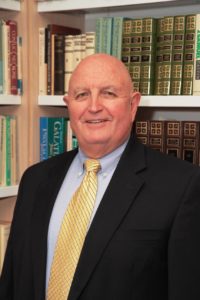
God’s Being and Man’s Becoming: Herman Bavinck and God’s Aseity
The new issue of  Credo Magazine focuses on The Aseity of God. The following is an excerpt from Ron Gleason’s feature article, God’s Being and Man’s Becoming: Herman Bavinck and God’s Aseity. Dr. Ron Gleason is a 1975 graduate of Gordon-Conwell Theological Seminary (M.Div., magna cum laude, member of the Phi Alpha Chi academic honor society) and a 1979 graduate of the Theological Seminary of the Reformed Churches of Holland (Drs. with honors in Ethics). Additionally, Dr. Gleason graduated from Westminster Theological Seminary (Ph.D, Systematic Theology) in Philadelphia with a dissertation on the “unio mystica” in the theology of Dr. Herman Bavinck (1854-1921). He is also the author of Herman Bavinck: Pastor, Churchman, Statesmen, and Theologian.
Credo Magazine focuses on The Aseity of God. The following is an excerpt from Ron Gleason’s feature article, God’s Being and Man’s Becoming: Herman Bavinck and God’s Aseity. Dr. Ron Gleason is a 1975 graduate of Gordon-Conwell Theological Seminary (M.Div., magna cum laude, member of the Phi Alpha Chi academic honor society) and a 1979 graduate of the Theological Seminary of the Reformed Churches of Holland (Drs. with honors in Ethics). Additionally, Dr. Gleason graduated from Westminster Theological Seminary (Ph.D, Systematic Theology) in Philadelphia with a dissertation on the “unio mystica” in the theology of Dr. Herman Bavinck (1854-1921). He is also the author of Herman Bavinck: Pastor, Churchman, Statesmen, and Theologian.
When I wrote my doctoral dissertation on Herman Bavinck’s idea of the centrality of the mystical union (unio mystica) of the believer with Christ, I realized that it is crucial to keep in mind that one cannot isolate one aspect of the totality of Bavinck’s theology at the expense of other large and grand components of the structure of his thoroughly theological mind. That truth most certainly holds true for his notion of man’s knowledge of God in general and with a view to his understanding of God’s aseity in particular.
Therefore, before I launch into an explanation of how the notion of God’s aseity is of importance for theology as well as for the men and women in the pew, I want to back up half a frame and lay some essential and indispensable groundwork.
The Incomprehensibility of God
The second volume of Bavinck’s Reformed Dogmatics (RD) devotes the opening two chapters to the general concept of knowing God. Chapters 1 and 2 are entitled “The Incomprehensibility of God” and “The Knowledge of God,” respectively. The opening words of § 161 read this way: “Mystery is the lifeblood of dogmatics.”[1] When Bavinck employs the term “mystery” he is using it in its normal, scriptural manner, which is that which is unknown and unknowable without God revealing it to man.
That being the case, it is also crucial that we understand that “the knowledge of God is the only dogma, the exclusive content, of the entire field of dogmatics. All the doctrines treated in dogmatics—whether they concern the universe, humanity, Christ, and so forth—are but the explication of the one central dogma of the knowledge of God. All things are considered in light of God, subsumed under him, traced back to him as the starting point.”[2] In other words, knowledge of God, knowledge of his nature, and knowledge of his character are indispensable for a truly Church dogmatics, and, by extension, for every Christian.
Citing Psalm 89:16, Isaiah 11:9, Jeremiah 31:34, and John 17:3, Bavinck can assert that “The knowledge of God-in-Christ, after all, is life itself.”[3] Each of the texts mentioned draws our attention to the knowledge of God. To substantiate his position regarding the knowledge of God, Bavinck quotes both Augustine and Calvin. Linking both authors to the biblical texts referred to, Bavinck proceeds and says this about the Church Father, Augustine. “Augustine desired to know nothing other and more than God and himself. ‘I desire to know God and the soul. Nothing more? No: nothing at all.’”[4]
He directs our attention to two sources from Calvin, the first from the opening words of his Institutes and the second from his Genevan Catechism. As far as Calvin’s Institutes are concerned, the opening sentence sets the stage for the remainder of that work. “Nearly all the wisdom we possess, that is to say true and sound wisdom, consists of two parts: the knowledge of God and of ourselves.”[5] In addition, the opening question and answer to the Genevan Catechism reads this way: “What is the chief end of human life? That human beings may know the God by whom they were created.”[6]
These quotations point us to the what but not to the how regarding the knowledge of God. Bavinck anticipates the dilemma and poses a question and then answers it in a manner that places Scripture at the center of the Christian theologian’s and the Christian’s life. He writes, “But the moment we dare to speak about God the question arises: How can we? We are human and he is the Lord our God. Between him and us there seems to be no such kinship or communion as would enable us to name him truthfully. The distance between the Infinite and the finite, between eternity and time, between being and becoming, between the All and the nothing. However little we know of God, even the faintest notion implies that he is a being who is infinitely exalted above every creature.”[7] I emphasize the words “being and becoming” for a particular reason, so allow me to explain.
Read Dr. Ron Gleason’s entire article in the new issue of Credo Magazine: The Aseity of God.
Endnotes
[1] Herman Bavinck, Reformed Dogmatics, Vol. 2, (John Bolt [ed.] & John Vriend [trans]), (Grand Rapids: Baker Academic, 2004), 29.
[2] Ibid., Emphasis added.
[3] Ibid., Emphasis added.
[4] Ibid.
[5] John Calvin, Institutes of the Christian Religion, Vol. 1, (John T. McNeill [ed.] & Ford Lewis Battles [trans.]), (Philadelphia: The Westminster Press, n.d.), 35.
[6] Bavinck, Reformed Dogmatics, 2:30.
[7] Ibid., Italics added.

